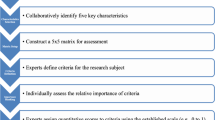Abstract
Incorporating AI-based decision-making into consumer credit assessment under the framework of Consumer Law enhances regulatory compliance. This paper outlines a Multi-Agent Systems (MAS) to implementing Art. 18(6)(8)(9) of the EU 2023/2225 Directive, dated 18 October. In pursuit of this goal, we propose a legal framework emphasizing the necessity of hybrid oversight in AI-based consumer scoring. This study aims to improve transparency and fairness through the implementation of an Explainable Agent-based layer. Overall, this research introduces the concept of Machine-Centred Anthropocentrism. It acknowledges that, after the training, validation and testing stages, credit analysts no longer have complete psychological control over the data-driven entities programmers have given birth.
Access this chapter
Tax calculation will be finalised at checkout
Purchases are for personal use only
Similar content being viewed by others
References
Thomas, L.C., Edelman, D., Crock, J.: Credit scoring and its applications: monographs on mathematical modeling and computation. Society for Industrial and Applied Mathematics, Philadelphia (2002)
Louzada, F., Ara, A., Fernandes, G.: Classification methods applied to credit scoring: systematic review and overall comparison. Surv. Oper. Res. Manag.Sci. 21, 117–134 (2016). https://doi.org/10.1016/j.sorms.2016.10.001
Dastile, X., Celik, T., Potsane, M.: Statistical and machine learning models in credit scoring: a systematic literature survey. Appl. Soft Comput. J. 91 (2020). https://doi.org/10.1016/j.asoc.2020.106263
Thomas, L.C.: A survey of credit and behavioural scoring: forecasting financial risk of lending to consumers. Int. J. Forecast. 16, 149–172 (2000). https://doi.org/10.1016/S0169-2070(00)00034-0
Addy, W., Ajayi-Nifise, A., Odeyemi, O., Falaiye, T.: AI in credit scoring: a comprehensive review of models and predictive analytics. Glob. J. Eng. Technol. Adv. 18, 118–129 (2024). https://doi.org/10.30574/gjeta.2024.18.2.0029
Bhatore, S., Mohan, L., Reddy, Y.R.: Machine learning techniques for credit risk evaluation: a systematic literature review. J. Bank. Finan. Technol. 4, 111–138 (2020). https://doi.org/10.1007/s42786-020-00020-3
Ferretti, F., Vandone, D.: Personal Debt in Europe: the EU Financial Market and Consumer insolvency. Cambridge University Press, Cambridge (2019)
Garcia, A., Garcia, M., Rigobon, R.: Algorithmic discrimination in the credit domain: what do we know about it? AI & Soc. (2023). https://doi.org/10.1007/s00146-023-01676-3
Wachter, S., Mittelstadt, B.: A right to reasonable inferences: re-thinking data protection law in the age of big data and AI. Columbia Bus. Law Rev. 494, 494–620 (2019)
Solove, D.J.: Artificial intelligence and privacy. Florida Law Rev. 77 (forthcoming) (2025). https://doi.org/10.2139/ssrn.4713111
Burrell, J.: How the machine ‘thinks’: understanding opacity in machine learning algorithms. Big Data Soc. 3, 1–12 (2016). https://doi.org/10.1177/2053951715622512
European Data Protection Supervisor (EDPS): Opinion 11/2021 on the Proposal for a Directive on consumer credits (2021). https://edps.europa.eu/data-protection/our-work/publications/opinions/edps-opinion-proposal-directive-consumer-credits_en
Lee, J.: Access to finance for artificial intelligence regulation in the financial services industry. Euro. Busi. Organ. Law Rev. 21, 731–757 (2020). https://doi.org/10.1007/s40804-020-00200-0
European Commission (Directorate-General for Justice and Consumers): Evaluation of Directive 2008/48/EC on credit agreements for consumers [Final Report] (2020)
Leal, A.A.: Algorithms, creditworthiness, and lending decisions. In: Moura Vicente, D., Soares Pereira, R., Alves Leal, A. (eds.) Legal Aspects of Autonomous Systems. ICASL 2022. Data Science, Machine Intelligence, and Law, vol. 4. Springer, Cham (2024). https://doi.org/10.1007/978-3-031-47946-5_17
Thomas, L.C., Ho, J., Scherer, W.: Time will tell: behavioural scoring and the dynamics of consumer credit assessment. IMA J. Manag. Math. 12, 89–103 (2001). https://doi.org/10.1093/imaman/12.1.89
European Banking Authority (EBA): Guidelines on loan origination and monitoring (2020)
Anderson, R.A.: Credit Intelligence & Modelling: Many Paths through the Forecast of Credit Rating and Scoring. Oxford University Press, Oxford (2022)
Trönnberg, C.-C., Hemlin, S.: Banker’s lending decision making: a psychological approach. Manag. Financ. 38, 1032–1047 (2012). https://doi.org/10.1108/03074351211266775
Anderson, R.A.: The Credit Scoring Toolkit: Theory and Practice for Retail Credit Risk Management and Decision Automation. Oxford University Press, New York (2007)
Sowa, K., Przegalinska, A., Ciechanowski, L.: Cobots in knowledge work human - AI collaboration in managerial professions. J. Bus. Res. 125, 135–142 (2021). https://doi.org/10.1016/j.jbusres.2020.11.038
Abbass, H.A.: Social integration of artificial intelligence: Functions, automation allocation logic and human-autonomy trust. Cogn. Comput. 11, 159–171 (2019). https://doi.org/10.1007/s12559-018-9619-0
Garibay, O.O., et al.: Six human-centered artificial intelligence grand challenges. Int. J. Hum.-Comput. Interact. 39, 391–437 (2023). https://doi.org/10.1080/10447318.2022.2153320
Zerilli, J., Knott, A., Maclaurin, J., Gavaghan, C.: Algorithmic decision-making and the problem of control. Minds Mach. J. Artif. Intell. Philos. Cogn. Sci. 29, 555–578 (2019). https://doi.org/10.1007/s11023-019-09513-7
Fitts, P.M., et al.: Human Engineering for an Effective Air-Navigation and Traffic-Control System. Ohio State University Research Foundation Columbus (1954)
Koulu, R.: Human control over automation: EU policy and AI ethics. Euro. J. Legal Stud. 12, 9–46 (2020). https://doi.org/10.2924/EJLS.2019.019
Wachter, S., Mittelstadt, B., Russel, C.: Counterfactual explanations without opening the black box. Harv. J. Law Technol. 31, 841–877 (2018)
Arrieta, A., et al.: Herrera, Francisco: Explainable Artificial Intelligence (XAI): concepts, taxonomies, opportunities and challenges toward responsible. Fusion 58, 82–115 (2020). https://doi.org/10.1016/j.inffus.2019.12.012
Aggarwal, N.: The norms of algorithmic credit scoring. Cambridge Law J. 80, 42–73 (2021). https://doi.org/10.1017/S0008197321000015
Methnani, L., Tubella, A.A., Dignum, V., Theodorou, A.: Let me take over: variable autonomy for meaningful human control. Front. Artif. Intell. 4, 1 (2021). https://doi.org/10.3389/frai.2021.737072
Author information
Authors and Affiliations
Corresponding author
Editor information
Editors and Affiliations
Rights and permissions
Copyright information
© 2025 The Author(s), under exclusive license to Springer Nature Switzerland AG
About this paper
Cite this paper
Rebelo, D.M., de Andrade, F.P., Novais, P. (2025). Anthropocentric AI for EU Consumer Lending. In: Santos, M.F., Machado, J., Novais, P., Cortez, P., Moreira, P.M. (eds) Progress in Artificial Intelligence. EPIA 2024. Lecture Notes in Computer Science(), vol 14967. Springer, Cham. https://doi.org/10.1007/978-3-031-73497-7_25
Download citation
DOI: https://doi.org/10.1007/978-3-031-73497-7_25
Published:
Publisher Name: Springer, Cham
Print ISBN: 978-3-031-73496-0
Online ISBN: 978-3-031-73497-7
eBook Packages: Computer ScienceComputer Science (R0)




